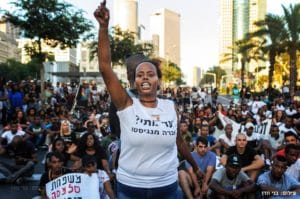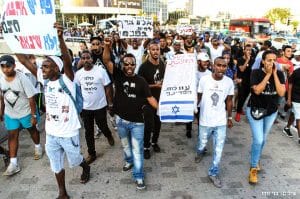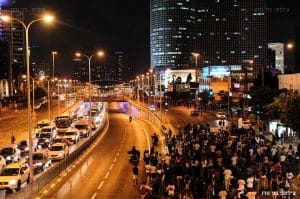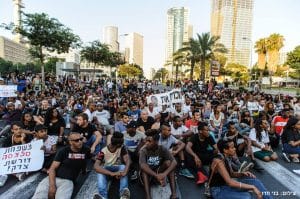Hundreds of Black youth march in Tel Aviv after Netanyahu government fails to satisfy their demands.
by David Sheen

Public protests against police brutality have erupted across the country in the past week after two African Americans, Alton Sterling and Philando Castile, were shot to death by officers of the law, rekindling the rage of the Black Lives Matter movement. Just two days earlier, however, another group of Africans descended on a metropolis half a world away to express their anger over the racist violence directed against their own sector of society. Demanding an end to institutional anti-Black racism by the Israel government, hundreds of Jewish citizens of Ethiopian heritage marched through the streets of downtown Tel Aviv on July 3, renewing demonstrations that had galvanized the community a year earlier.
The mostly young Ethiopian-Israeli protesters called for abusive police officers to be jailed and blocked a main street in front of the headquarters of the Ministry of Defense. Hours later, demonstrators tried and failed to block the Ayalon Highway, the country’s most traveled traffic artery. Police arrested at least a dozen individuals over the course of the rally for “disrupting public order,” later releasing them in the wee hours of the morning.
Many of the protesters carried signs and stickers emblazoned with the name and the face of Yosef Salamsa, a 22-year-old Ethiopian-Israeli who had died exactly two years earlier. In July 2014, Salamsa’s dead body was found at a quarry on the outskirts of his home town, Zichron Yaakov, in the north of the country. Salamsa’s family and many community members believe that Yosef’s death is connected, either directly or indirectly, to the abuse he faced at the hands of Israeli police officers months prior.
Black people profiled by Israeli law enforcement officials

In April 2014, Salamsa was attacked by police officers as he sat on a park bench a stone’s throw from his home. Police audio recordings revealed that the officers, investigating reports of a break-in nearby, approached Salamsa and tasered him without warning. He had no prior criminal record.
In the months leading up to his death, Salamsa and his family were targeted for harassment by the police, after Yosef submitted an official complaint over the April assault. After Salamsa’s death, police officials prevented family members from identifying his body before it was buried.
“We only wanted for Yosef’s story to be known and for justice to be done. For his story to not be buried with him, as many stories were buried,” says Salamsa’s cousin Tehune Maharat, a driving force behind the protests. Maharat told the San Francisco Bay View that Yosef was just one of many community youth who have unwittingly become targets of police violence in recent years.
“Many youth were murdered because they were Black. They experienced police brutality, they were beaten, humiliated and abused, just because they were Black. Not for any other reason,” she says.

Racist violence against the Ethiopian community captured Israeli newspaper headlines last spring after the release of a viral video documenting police brutality. The video, in which police officers were seen beating an Israeli soldier of Ethiopian heritage without just cause, incensed the community, setting off a string of mass protests in Jerusalem, Tel Aviv and other parts of the country.
While the protests have triggered a political renaissance amongst Ethiopian-Israelis, they have thus far failed to elicit the support of a broad base of the general public. Community activist Inbar Bugala, one of the most recognizable faces and voices at the protests of the past year, told the Bay View that by and large, white Israeli citizens are not sympathetic to their struggle. “The entire country is averting its eyes. People are being murdered here because of their skin color, and the public is fine with it,” she says.
Bugala blames the mainstream media in Israel for this state of affairs. “For years, the police profiled Black people, and the media converted the public. They always show Black people in a negative light, as criminals, as problematic, as alcoholics. So it doesn’t matter how the police treat Black people; even if the media reports on it, the white public is fine with it. Because the Black person is a criminal to begin with, even if they have not done anything! They are a criminal by virtue of their being Black,” says Bugala.

Maharat agrees that most Israelis remain apathetic to their appeals, admitting that even after a year of public campaigning, their efforts to engage white Israeli society have borne little fruit. “We are active in the streets,” she says. “We walk amongst the people, and the vast majority of them still do not believe that this issue is real, that there is really racism against the Ethiopian community, against the Black community. They do not accept the fact that people are racist towards Black people.”
Frustrated by their inability to cultivate a broad base of white allies, Maharat wonders why they have come up short. “Israeli society is either blind, in a bubble of its own, where everything is fine, or else it doesn’t want to deal with reality. Even when you explain it to them, and bring them proofs, evidence, the reality of daily [racism] – all you have to do is bring them to the [Ethiopian] neighborhoods – and they still don’t understand. They deny it, they ignore it or they minimize it,” says Maharat.
Grievances include injections that reduced the Ethiopian birth rate
While police brutality against their community was the spark that ignited the Ethiopian-Israeli protests of 2015 and 2016, it is not the community’s only grievance against the government. At the July 3 rally, demonstrators carried a coffin featuring a long list of complaints against the state. These include bitterness over state practices which have perpetuated separate streams for Israelis of Ethiopian heritage in education, in the military and in housing.
“I don’t only blame the police,” says Maharat. “These are decisions that come down from on high, from a failed policy, from an institutionalized policy, that says: ‘Ethiopians separate and Israelis separate.’ All it would take is one person to resolve that there will be no more racism, no more separation, no more discrimination on the basis of religion, race or sex, and then these things won’t occur. It comes down the chain of command. The rot starts at the top, there’s no two ways about it.”

Topping the list of other outrages that have provoked the anger of Ethiopian-Israelis is the pressure exerted on Ethiopian women in the past to consent to long-term birth-control injections. In late 2012, dozens of women accused agents of the American Joint Distribution Committee, who were working in coordination with the Israeli government, of hinging their immigration to Israel upon agreeing to receive regular shots that prevent conception for months at a time. Researchers found that in the years that followed, the birth rate of the Ethiopian community fell by almost 20 per cent.
In January, State Comptroller Joseph Shapira announced that after investigating the charges, he had come to the conclusion that no Ethiopian women had in fact been coerced into receiving the shots. A week later, it was revealed that while carrying out the inquiry, Shapira had refused to hear testimony from any of the Ethiopian women who had made the original accusations.
Though the media commonly refers to the scandal by the name of the drug which was administered, Depo-Provera, Maharat and Bugala both reject that terminology, instead calling the shots “genocide injections.” “They don’t want there to be more Ethiopians in the state of Israel,” says Bugala. “To give injections to prevent women from conceiving children? If that’s not genocide, then I don’t know what else to call it. You can’t refer to it by the name of the drug and then just dismiss it.”
Netanyahu accused of manipulating Ethiopian protest leaders

The July 3 protest in Tel Aviv was timed to dovetail with the two-year anniversary of Salamsa’s death, but it also conveniently coincided with a four-day trip to Africa by Benjamin Netanyahu, the first such trip by a sitting Israeli prime minister in decades. It is unclear if the optics of the Tel Aviv rally and its accusations of anti-Blackness embarrassed Netanyahu, just as he was hoping to convince African heads of state to support Israel’s request for observer status in the African Union.
If they had, it is doubtful if Bugala would have lost any sleep over it. “The prime minister fooled us with his words,” she says.
After thousands of Ethiopian-Israelis marched on Netanyahu’s Jerusalem residence in April 2015 to protest police violence and state-sponsored racism, the premier agreed to give an audience to a small group of community activists that included Bugala, ostensibly in order to hear them out. Since there had been little to no continuity between previous waves of Ethiopian activists and the current crop of anti-racist campaigners, Bugala and her peers weren’t aware that Netanyahu had already been apprised of the many problems plaguing the community. She soon came to learn that Netanyahu was far more knowledgeable – and manipulative – than he would let on.
“‘I will make changes. I care. I didn’t know that this is the state of the community,’ says Bugala, paraphrasing what she says Netanyahu told her and her fellow Ethiopian activists at that private meeting in May 2015. “Bullshit! In 2012, activists met with him, with the same demands as ours. And the prime minister sits there looking at us and tells us, ‘I didn’t know.’ Then we met them [the other activists], and saw that they made the same demands.”
The previous wave of Ethiopian activists had mobilized back in January 2012, after it emerged that an entire neighborhood in the southern city of Kiryat Malachi had conspired to keep Ethiopian-Israelis out of the area, signing a secret document pledging their refusal to sell or rent flats to anyone from the community.
The Ministry of Justice exonerated those police officers that had been caught on camera abusing an Ethiopian-Israeli soldier, calling their behavior “impeccable.” A committee established by the police commissioner to examine past case files involving Ethiopian-Israelis declared conclusively that it had found no evidence of any race-based discrimination. A proposed parliamentary inquiry into Ethiopian accusations of state racism and police violence was shot down by the government.
While Netanyahu has failed to honor most of the commitments he has made to the Ethiopian community, there is at least one promise that he has kept to the letter: to allow an Ethiopian-Israeli citizen to languish in the Gaza Strip for the past year.
When an Ethiopian-Israeli family realized in 2014 that their troubled son, a civilian, had crossed into Gaza and was being held there by Hamas, the government urged them not to go to the press, but to trust the government to quietly work to free him. After the government made little to no effort to retrieve their son over many months, the family began to suspect that he had been abandoned because he was Black. “It’s more than racism,” the young man’s brother said. “I call it anti-Blackism.”

Netanyahu promptly dispatched a deputy to deal with the family of the young man, Avera Mengistu. In an audio recording from that meeting, Netanyahu’s emissary is heard threatening the Mengistu family, warning them that if they suggest that state racism is playing a role in their son’s continued absence, the government “will leave him another year in Gaza.”
Though the Israeli media failed to make any mention of it, last week marked a full year since those statements were made.
Next wave of Ethiopian protests may be fiercer than before
Just as the wider Ethiopian-Israeli protests have yet to achieve their ambitious objectives, so has the Salamsa family’s search for justice fallen short. Although an internal inquiry found that the officers who abused Yosef blatantly lied in their official testimonies, police commanders have decided not to lay any charges against them. And though the protests have yet to yield significant fruits, Maharat says that she will not give up the struggle, even if only to try and inspire a new era of activism.

“I am fighting for my brothers, so they see that I am fighting. That I am not silent, and if something bad happens, that I respond and speak out. So they learn to stand up for themselves when they grow up, so they demand what’s coming to them. And for those youth to know that someone is fighting for them. Because we won’t be able to bring back Yosef.
“We demand the truth, and a better future for the living. Because we can’t bring back the dead. It’s to influence the next generation, to help them, so they won’t feel alone,” says Maharat. “We came to remind them to be themselves, and to be proud of it, because you have plenty to be proud of.”
In the absence of any serious efforts to address the charges of institutional racism, future conflict between the Israeli state and the Ethiopian community is almost inevitable. When that day inexorably arrives, the Israeli government will find itself facing off against activists with a newfound sense of institutional memory, activists ideologically bolder than before.
The bitter recollection of his betrayal may not have only alerted Bugala and Maharat to Netanyahu’s ways of deception; it may also have awakened them to the possibility that the solution to Israeli anti-Blackness might never be found in a state that is based on privileging one ethnic group over another to begin with.
“You realize that no matter what you do for this country, no matter how much you contribute, no matter how much you try to ‘fit in,’ no matter how much they try to fit you in, at the end of the day, the bottom line is, what they see is your [skin] color,” says Maharat. “And what they think is that you are less than them. And what they know is to make you feel insignificant.”
David Sheen is an independent journalist based in Dimona, Israel. His website is davidsheen.com and he tweets from @davidsheen.






